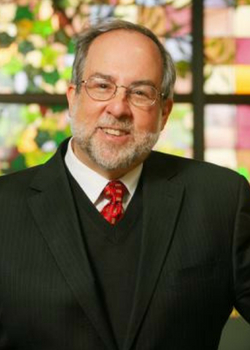Pity Esau. One moment of weakness, one momentary impulse, and his birthright is gone. He rushes to fulfill his father's dying wish for a savory meal, and while he's out hunting, his mother and brother conspire to rob him of his blessing. Returning to his father with the feast, expecting at last to gain his due, he is met with his father's empty excuses. And so he cries: "Have you but one blessing, Father? Bless me too, Father!" And Esau wept aloud (Genesis 27:38); tears of betrayal, of pain, of rage, of broken dreams.
Two brothers. One blessing. Who told Father Isaac that he had but one blessing to bestow upon his sons? Who told him that blessings must be hierarchical -- setting one brother over the other, declaring one the victor and the other a loser? Why can't he see where this leads? Has he no sense of the bitterness and turmoil that will come of this? Is his spiritual imagination so small that he cannot find a unique blessing for each of his sons? Is this the blindness that afflicts him?
Two brothers, one blessing. This is the dynamic drama of Genesis. Sigmund Freud posited that the Oedipal struggle – the child’s relationship to the parent -- drives human development. But the Bible believed differently. In the Bible, the struggle among siblings is central: Out of jealousy, Cain murders Abel. Abraham separates from his brother's son Lot because there can be no peace between them. Ishmael is cast out of the family to make room for Isaac. Jacob deceives his blind father and steals his brother’s blessing. Joseph's brothers sell him into Egyptian slavery. Beneath the tales of Genesis, lives this legacy of hatred, rage, estrangement, murder, and pain.
More than the stories of our dysfunctional family, Genesis is an alarm, a scream of warning, against the irresistible human propensity to think in binary terms: Us/Them. Our People/Those People. The Good Brother/The Evil Brother. The Children of Light/The Children of Darkness. This calculation always yields the same result: the Other. Who is the Other? We call him by many names, but he is always the same. Cast out for his unrighteousness. Undeserving of blessing. Evil. Dark. Alien. Excluded. Estranged.
Why do we human beings always seem to need an Other? What emptiness within our soul does it fulfill? What comfort does it give us to identify, to isolate, to castigate, to scorn an Other? Politicians love him. Demagogues thrive on him. There is no easier way to the heart of a people than through our fear of the Other. There is no more compelling fantasy than a narrative that culminates with the destruction of the Other. Whole cultures grow from these narratives.
Two brothers. One blessing. This is the dark side of monotheism. Monotheism can bear two very different interpretations. The belief in one God can yield two different worlds. A monotheism of exclusion imagines one God who belongs to me and not you. One truth that is ours and not theirs. One world gifted to us, and not to them. This brand of monotheism offers blessing to one brother, and subjugation, exile and death to all others. Genesis vehemently protests this. God is not so small, so narrow, so parochial as your fear and hatred. Genesis offers a radically different religious vision, a monotheism of inclusion – a God of all. God is creator of all. Not just our tribe and our kind, but all. And more radically -- all are created in the image of God. Everyone bears the divine within.
Who is the Other? We come from the same parents, Genesis answers -- he is your brother. So know this: Divide yourself from him, treat him with contempt, remain indifferent to his plight, disregard his anguish and his rage will consumes everything you hold dear. You will never have peace. You will never be whole until you meet him and make peace with him. Be careful. His rage is potent. But if you have the courage to confront him, to meet and embrace him, you will find him ready to receive you.
"Looking up, Jacob saw Esau coming, accompanied by four hundred men. He divided the children among Leah, Rachel and the two maids, putting the maids and their children first, Leah and her children next, and Rachel and Joseph last. He himself went on ahead and bowed low to the ground seven times until he was near his brother. Esau ran to greet him. He embraced him, falling on his neck, he kissed him, and they wept. (Genesis 33:1-4)
Again, Esau weeps. But this time, different tears. For the years consumed and wasted in rage, hatred, bitterness and fear. For the brokenness endured until each brother realized that he could have his own, unique blessing. And for the generations of their children who will yet live by dividing -- believing in their blindness that there is only one blessing. Taught the Psalmist: Hiney ma tov u’ma naim, shevet achim gam yachad. How good and precious and rare it is, when brothers can dwell together.
Shabbat shalom.

